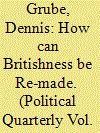| Srl | Item |
| 1 |
ID:
108319


|
|
|
|
|
| Publication |
2011.
|
| Summary/Abstract |
Modern Britishness is widely seen to be based on shared values like 'fair play', 'tolerance', and respect for 'diversity'. Can such a 'values-based Britishness' be effective as a national binding agent in an era of devolution and globalisation? The idea that a uniquely 'British' character is based on shared values of some kind is not new. The contemporary debate is framed by decisions made over a century ago in the Victorian era-when the decisive shift occurred from a British identity based on religious difference to one based on shared moral values. Through political rhetoric, legislation, and the courts, Victorian governments shaped and changed the character of Britishness. The same tools remain available to contemporary lawmakers in shaping a twenty-first century Britishness that embraces modern universal values, but also defines some more uniquely British emotional connection points around which national identity can be built.
|
|
|
|
|
|
|
|
|
|
|
|
|
|
|
|
| 2 |
ID:
123774


|
|
|
|
|
| Publication |
2013.
|
| Summary/Abstract |
Democratic governments have spent much of the last two decades attempting to recalibrate their governance systems around a single focal entity: the citizen. The all-pervasive rhetoric of citizen-centred governance has seen policies conceived, delivered and evaluated in terms of the satisfaction levels achieved by individual 'citizens'. This article argues that by disaggregating societal interests down to the smallest available individual unit - the citizen - policy makers have created unrealistic expectations of individual participation, leading to public distrust when 'citizen-centred' rhetoric does not match reality. Simultaneously, the focus on individual outcomes has narrowed the policy-making gaze away from wider society-level measures that could create more robust policy options in the face of 'hard choices.' The result - paradoxically - is that the more government focuses on pleasing the individual citizen, the less trusting those citizens are of government's ability to deliver meaningful outcomes.
|
|
|
|
|
|
|
|
|
|
|
|
|
|
|
|
| 3 |
ID:
136150


|
|
|
|
|
| Summary/Abstract |
Public service mandarins were once largely anonymous, diligently wielding their great power behind the scenes while their political masters performed on the front stage. Things have changed. Today, civil service leaders are appearing publicly more often, in more places and to a wider range of audiences than ever before. This article examines the extent to which this decline in anonymity impacts on traditions of civil service impartiality within the Westminster system. It draws on the late Peter Aucoin's concept of ‘promiscuous partisanship’ to examine how contemporary mandarins in the United Kingdom, Canada and Australia face accusations of having compromised their impartiality by advocating for the policy agenda of the government of the day. The article argues that what has changed is not that civil service leaders have suddenly become partisan, but rather that they have become more ‘public’, allowing for perceptions of partisanship to emerge
|
|
|
|
|
|
|
|
|
|
|
|
|
|
|
|